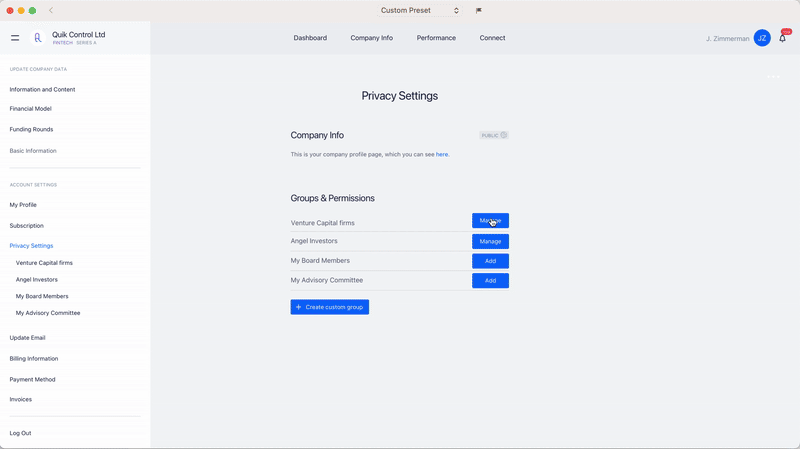Floww
Challenge
Floww.io is a social network connecting startups with angel investors and venture capitalists. While many startups were signing up, few completed their profiles with key financial details such as CAP tables and EBITDA. Without this information, investors could not assess opportunities effectively. The challenge was to understand why startups were reluctant to share data and design a way to build their confidence in doing so.
My Impact
As the senior UX designer, I led research with existing customers to uncover the reasons behind low activation and trust. I identified where privacy and transparency were breaking down and designed new UX flows that introduced more granular privacy and security controls. This gave startups clearer visibility over what data was being shared and with whom. My role covered research and design through to prototyping, concluding before development began.
Solution
I redesigned the privacy settings to give startups full control over their data visibility, with clear explanations of what information was shared with other startups, investors, or direct connections. Default settings supported common use cases, while optional customisation allowed for flexibility. The new approach improved trust and engagement by making data sharing transparent, helping startups feel confident enough to complete their profiles and take advantage of Floww’s analytics and investor-matching features.
Role Senior UX Designer | Year 2021
Process
User Research
Identifying Pain Points
I began by speaking with existing users to understand their experience of using the platform, particularly when connecting with Venture Capitalists (VCs) and angel investors and sharing their financial information.
Key insights from user research:
Users were unclear about which information was shared with all investors on the platform versus those they had directly connected with.
There was confusion about which information could be seen by other startups (potential competitors) on the platform.
The platform’s privacy settings weren’t granular enough, forcing users to choose between sharing everything or nothing at all.
Due to unclear privacy settings, users lacked trust in the platform to keep their information confidential.
Users were opting out of the platform's graphs and analytics—available only after uploading financial data—because they didn’t trust the privacy settings.
“I’m not entirely clear on what exactly investors can see when they look at our profile on the platform. I’m worried that they might be able to access more information than I intended to share.”
Customer Research Interview
“I’m worried our financial performance might be compared to larger, more established startups.”
“What if our competitors see that information and copy our business model?”
Market Analysis
Learning from Other Social Networks
In addition to user research, I reviewed privacy settings across several social network platforms, such as Facebook and Instagram. Key insights included:
Social media platforms provided far more granular privacy settings than Floww.io.
Users could control information disclosure for different groups (e.g., friends or acquaintances) and could create custom groups or use automatically generated ones.
Platforms distinguished between profile information (e.g., age, profile photo) and uploaded content, allowing different privacy settings for each.
Different privacy settings are applied depending on the content type (e.g., Instagram Posts vs Stories).
Instagram Privacy Settings
Facebook Privacy Settings
UX Flows
Prioritising User Control and Clarity
Based on the findings from user research and market analysis, my goal was to create UX flows that:
Allowed greater control over which information was shared with different groups of users, such as other startups, investors, or connected investors.
Gave users a clear overview of what information was being shared with whom.
Offered default settings tailored to most users' needs while allowing for customisation.
Enabled investors to send data requests to startups, which the startups could approve before sharing.
UX Flows in Sketch
Prototyping
Testing and Iterating
Using the UX flows, I developed a series of Sketch prototypes. These allowed the team to test and explore the flow of privacy settings and screens. The prototypes sparked discussion, ideation, and iterations before being handed over to the customer success team for feedback from customers.
Sketch prototypes built for team discussion, feedback, and ideation
Updating the Floww Design System
Floww.io had a detailed design system in place, which I updated and maintained throughout the project to ensure consistency and alignment with the brand.
Floww.io design system in Sketch: Dark and Light modes








